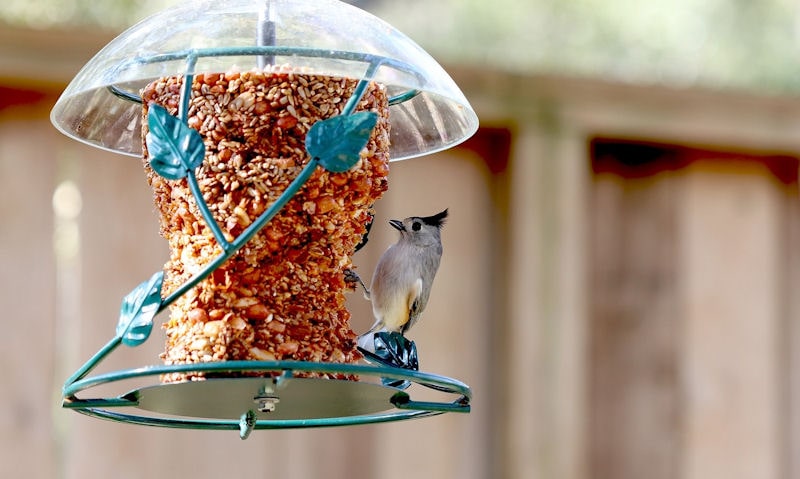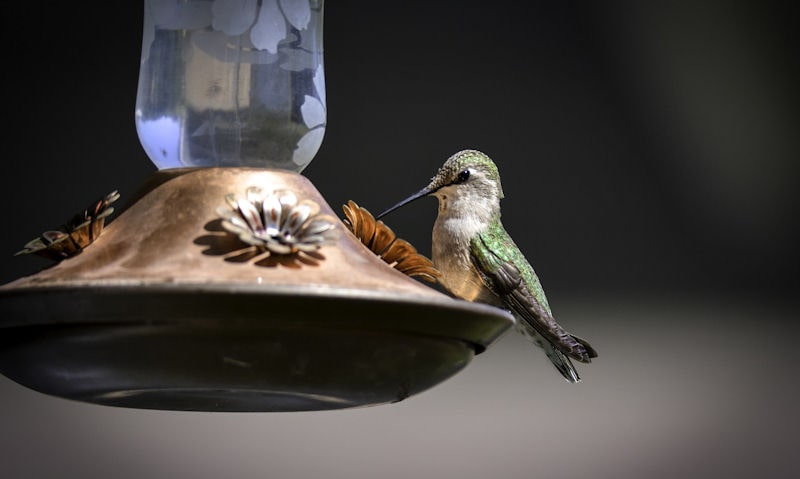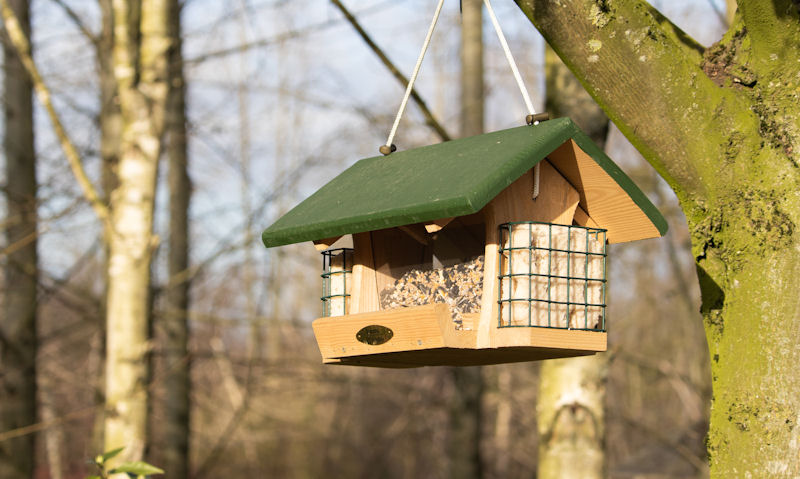Should bird feeders be used in summer
Benefits to bird feeders is that you can feed birds off the ground, away from pests or pets, which absolutely applies more in summer than any other time.
Bird feeders should be used in summer as birds continue to visit as normal, only more dried or live mealworms must be provided - while remaining accessible which may involve feeding mealworms out of feeders. Do suspend feeders in more shade while think about changing out bird feed more regularly.
Food shortages across the United States can happen any time of the year, with summer especially causing drought where wild bird feed is difficult to forage in their natural habitats, thus bird feeders can help make up what is lost in the wild.
Nectar sipping Hummingbirds will still need their Hummingbird feeder, as the only means to provide sugar water to local Hummingbirds.
Similarly, Orioles must continue to be provided nectar that can only be achieved with nectar stored away in an oriole nectar-filled feeder.
Orioles also feed on jelly that is put in a suspended tray or dish - and therefore is a type of bird feeder that must be used in summer - whereas jelly will be too accessible to insects and pests if not utilizing a type of oriole feeder, providing some restrictions.
Nectar stored away in a plastic or glass bottle - or jelly placed in a dish - must all be situated out of direct sunshine at all times.
Bird feeders made for suet, seeds or nuts believe it or not are continued to be used by your most reliable common backyard birds; if you at least clean bird feeders and change out bird feed more often than other times of the year.
What to feed birds in summer time will be what birds eat all year round, although you'll find dried or live mealworms will take priority.
Feeding birds within bird feeders can certainly result in saving wild birds in summer, yet its easy to forget birds will need a close source of water - provided in a dish or a bird bath - often used as way to help birds digest bird feed.
My number one summer bird feeding tip I can leave you with is always prioritize more dried or live mealworms; which is a type of wild bird feed that most most people don't seem to provide any other time of the year as it happens.
Continue bird feeder use
What kind of bird feeders you've been utilizing in the winter through spring time, should now continued to be used in summertime.
Birds must be provided their favorite bird seeds like you've always supplied, along with mixes of mealworms or suet.
Meanwhile, peanuts can be provided to birds in its corresponding nut feeder - only it helps to crush up the nuts into smaller pieces - to avoid birds feeding their young on a potential choking hazard.
I know there is mixed messages involving around should you feed suet to birds in summer, well, you should - as wild birds will still eat all kinds of suet regardless.
Bird feeders to provide wild birds seed mixes or just millet or their favorite sunflower seeds will remain suspended in its regular place. Whereas what you put on a platform bird feeder or dish carries on as normal.
Backyard birds absolutely do change their dietary needs in summer - like prioritizing more insects over seeds - while at the same time they can still be fed on what you can afford to offer them.
Do use bird feeders in summer with a priority on their normal bird feed you provide all year round, and if you can... do think seriously about providing more dried or live mealworms than ever before.
Mealworms in accessible feeders
While most of your visiting common backyard birds will continue to eat at bird feeders on what they've always eaten in winter and spring - like seeds or berries - I will say most insect-eating birds will prioritize more mealworms in summer.
Bird feeders must be used in summertime to provide wild bird feed to birds, yet dried or live mealworms won't go in a bird feeder, in the traditional sense.
Instead, how you'd feed dried mealworms to birds is on top of an open metal tray or dish.
Mealworms can go in a confined bird feeder that is suspended on a pole or branch, only this method can restrict how many and what species can access the mealworms.
Feed dried or live mealworms to wild birds in your yard on an open tray or platform, then all birds that wish to eat these mealworms, can do without restrictions in place.
In a sense then bird feeders for mealworms shouldn't be used in summer - or in the autumn or winter - because birds will struggled to access them in a mesh or tube feeder.
Fruits can go in suet cage
Not many but some wild birds like American Robins do eat fruits at other times of the year, and therefore can be found to eat what fruit you've provided in summer.
How to feed fruits to birds in summer will closely be linked to how or where you place a mealworm feeder for wild birds to find and access.
Fruits must absolutely be put on top of a platform feeder or in a mesh wire feeder, as opposed to inside an enclosed tube bird feeder.
Bird feeders made to hold seeds or nuts are not made to hold fruits or berries.
You shouldn't use bird feeders to store away fruits but you can in fact think about utilizing a suet cake bird feeder to hold apples wedges or orange halves.
When no suitable suspended bird feeder is made available - and especially when you have cats or a pest problem - then its vitally important to keep fruits out of reach.
Fruits can go in a suet cake or fat ball feeder if you like as it will at least help keep summer insects from swarming the citrus fruits.
Don't take out of bird feeders likely
Absolutely is it possible your backyard birds will refuse to use a too confined bird feeder, but for those birds that visit any other time of the year, feeders will be used as normal.
Despite that, its vitally important to cater to as many backyard birds as you can, by not always relying on your suspended bird feeders.
In fact, you'll benefit with an higher uptake of bird feed being eaten if this bird feed is made available out in the elements. Summer does bring nicer weather with certainly a possibility of summer showers and thunderstorms occurring still - yet summer does give you dryer days for an extended time in which you can take advantage.
How to feed birds in summer especially is to do so out of confined bird feeders, and on top of a dish or platform feeder.
No platform bird feeder or bird dish? then don't despair. Simply make use of an old cereal dish you can now use to put a mix of wild bird feed in.
Of course this dish isn't a traditional bird feeder but its sure a grand old way to feed birds, where you'll find many constrains and limitations on traditional bird feeders.
Consider shading bird feeders
With bird feeders being used in summer, it must be done in such as way the bird feeders, and therefore the bird food, can be protected from the sun.
Make no mistake about it, bird feed can quickly begin to rot when exposed to direct sun light, and so you'd get far less time on the feed outdoors than you would in winter.
Humidity and general heat can't be avoided mind thus the only way to sustain bird feed within bird feeders or in a open dish or tray - would be to locate bird feeders in any available shade you can find.
Bird feeders suspended out of direct sunshine with a cool spot in the shade can certainly sustain bird feed.
Most important type of bird feeder to locate in shade is that of nectar-filled feeders for Hummingbirds or Orioles. In case of Hummingbirds, their feeders can be kept cool in a breezy shaded spot - yet Hummers require being fed in a sunlit up area.
I will say however a shaded spot could indeed push the bird feeders to within a darken corner if you try too hard. Its still important to prioritize a lit up sky above, with bird feeders located in a lit up area in general while avoiding the sun.
Birds are provided suet in summer and will eat it if not at a slower pace. However, suet cakes offered in direct sun all day long can see homemade suet in particular, rapidly go bad in a matter of days.
Shade can postpone the possibility of suet or other bird feed going bad so quickly.
Change, clean more often
With bird feeders continuing to be used in summer time as normal then, its imperative you continue to look after your bird feeders.
By that I mean whichever bird feeders you suspend or locate around your yard in the summer months - they must be cleaned and maintained as you always have.
Bear in mind bird feed will quickly rot in bird feeders thus to sanitize bird feeders after each soapy wash is more important than ever. Humidity will also create an humongous mess within feeders, as residue or bird feed sticks to the interior.
Change bird feed more regular during the hotter months - and that doesn't just apply to summer time only - to be sure the seeds are still moist and the suet is still at its best quality.
Bird feeders will probably need to be cleaned out from once or twice a month in winter, to now two or three times in summer.
Its easy to forget that hot weather brings all kinds of health hazards around feeders - so to avoid the spread of disease that can see an uptake in summer - its vital to keep bird feeders clean, with the bird feed replenish as regularly as you can.
Summary
To feed birds in our yards a bird feeder will be the first port of call, because its a way to attract wild birds to a device they've come to recognize as a food source.
When you take away bird feeders, this once reliable way of attracting birds to your yard, becomes that little bit more difficult. Most visiting birds to your yards can only feed on elevated areas - like they do when foraging in trees in the wild - and so with no bird feeder suspended off the ground, it becomes a place to avoid.
Birds who feed on the ground will continue to do so, yet will take advantage of accessible bird feeders if made available.
Exclusive tree or off the ground foraging wild birds who don't feed off the ground - like Finches or Warblers - will now have no way to feed in your yard.
So absolutely continue to feed wild birds within bird feeders in summer time, as the repercussions can be far more reaching then you could ever imagine.
Be it insect or, and seed-eating birds who visit your bird feeders prior to summer, spill bird feed out of bird feeders to make it accessible to all.
Mealworms, much like the insects birds prioritize in summer, can be used more in summer of which, a tray or platform must be used as oppose to a too confined mesh or clear tube feeder.


